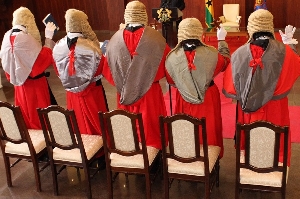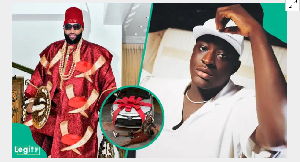Orangeburg, South Carolina
24th September, 2013
According to media reports, the New Patriotic Party’s leadership is planning to reverse the normal order of elections as laid down by our constitution and elect a flag-bearer before having constituency and polling station elections ahead of the 2016 election cycle.
This idea flies completely in the face of commonsense and good judgment. It is the equivalent of a person who just got divorced jumping into a relationship with the first person of the opposite sex they meet without any reflection on how the old relationship failed.
We just lost an election we should have won by any reasonable measure—twice—on voting day and on judgment day. With all respect to those who still insist that we won the election but were robbed, the first step to recapturing power will be an acknowledgement that we lost 2012. When a party needs nearly 4 million legitimate votes to be annulled in order to win an election, that party lost that election. Furthermore, clinging to the fiction that we won this election gets in the way of asking the hard questions we need to ask if we are to return to the Presidency and a Parliamentary majority.
It would appear that those in a hurry to stampede the party are afraid of what time and reflection will do to their fortunes. They are focused on those fortunes—not the party’s interests or traditions.
Let me pause here to acknowledge that I am not writing today to condemn anybody. I believe that Nana and his campaign team worked very hard and very long. Therefore, I commend them for all their effort. However, acknowledging their hard work leads me to the hard questions we must ask and answer before we turn to the question of choosing new leaders and ultimately a new flag-bearer. First, how could Nana Akufo-Addo, who has been campaigning for President full time since 2008 lose to John Mahama who had barely 4 months to campaign? Second, why did we win only two regions? Is it true that “poor illiterate Fantis do not want to vote for an Ashanti party?” as claimed by some of our leaders? If that is the case why did they vote for Kufuor, the Ashanti, against Mills, the Fanti twice? What about Western, Brong-Ahafo and Greater Accra? Why did they vote against us? Might it be that as Shakespeare put it, “the fault is not in our stars but in ourselves”?
Third, was there something wrong with our message and how it was communicated? If Nana’s gracious concession after the Supreme Court verdict got so much acclaim across the country, does it tell us something about our communication during the campaign?
Fourth, did we have a good strategy for prosecuting the campaign? Some have argued that we lost the elections in the last few days due to the infusion of money at the last moment. Is that really true when I, from my own independent observations, had called the Central Region for the NDC at least a month before polling day? Were our field operatives lying to the national campaign? What did our own internal polling show?
Fifth, did we have plans for ballot security? On at least three occasions in the last two months of the campaign, the Chair of the EC warned all parties to be vigilant on election-day. Furthermore, 6 clear weeks before the vote, the much-maligned Tarzan wrote a letter to our Presidential candidate urging vigilance at the polls. Why were they ignored? Sixth, was our campaign inclusive? Did we do proper selection and training of our polling agents? Or might it be that before our foot-soldiers went to sleep for our “tilapia” to be stolen, our leaders were asleep?
Seventh, was the decision to go to court carefully considered and based on a sober consideration of the evidence available or was it a last desperate throw of the dice by a campaign team that was embarrassed by the results of a campaign that had been badly conducted?
If the elections were flawed, why was our Campaign Manager defending the E.C. conduct of the elections on the day of the extended voting? Eighth, granting the wisdom of the decision to go to court, was the case prosecuted well? Did we seek the proper reliefs? Why were three former Attorneys General sidelined during the case only to be brought in to study the case after our defeat? What was the role of our Constitutional and Legal Affairs committee in this case?
Was Dr. Bawumia, who did not attend even one IPAC meeting our best witness or were others who might have done our case more justice sidelined for factional reasons? Why did we not have a clear strategy to reverse the NDC’s Parliamentary majority as part of the case? How was Nana going to govern with an NDC majority in parliament?
In raising these questions, I do not presume that any mistakes were made—I presume that like every human institution, the NPP can benefit, with apologies to Kweku Baako, from an “honest interrogation” of our campaign and court process.
Since 1992, Ghanaians have changed the governing party after every 8 years. That eight-year change is due to occur in 2016, unless, as we have done before, we snatch defeat from the jaws of victory. The nation is restless and it appears to be yearning for NEW leadership. The NDC government appears tired. Let us for once, do our homework well so that guided by the lessons of our failures in 2008 and 2012, we can return to government with a healthy Parliamentary majority in 2016.
We can win—together.
Arthur Kobina Kennedy
Opinions of Thursday, 26 September 2013
Columnist: Kennedy, Arthur Kobina














